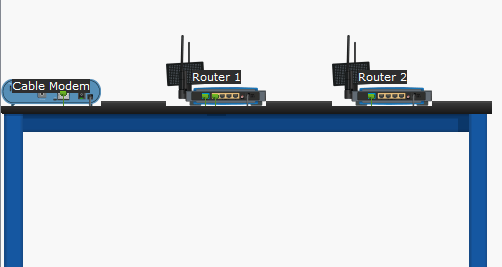5
1
Setup:
ISP
+
+ --------------------- -----------------------------------------
+ | Internet Modem | | Router 1 |
+ | | | |
+ | CABLE ETHERNET| | WAN LAN1 LAN2 LAN3 LAN4 |
+ |-- + -------- + ---| |-- + ------------------------------ + --
++++++++ +++++++++++++++ +
+
++++++++++++++++++++++++++++++++++
+
|-- + -----------------------------------
| WAN LAN1 LAN2 LAN3 LAN4 |
| |
| |
| Router 2 |
-----------------------------------------
Router 1 = LinksysEA2700
Router 2 = unknown for now (don't have access to it yet)
Router 1 IP = 192.168.1.1 DHCP enabled
Router 2 IP = 192.168.2.1 DHCP enabled
I have a few questions:
- Will clients connected to network
Router 1andRouter 2have access to Internet? (there won't be any firewall or other restrictions) - Will clients connected to
Router 1be able to see data from clients onRouter 2? - Will clients connected to
Router 2be able to see data from clients onRouter 1?
Basicly what I need is 2 separate (isolated) networks.
Thank you!

You mean Linksys EA2700? – devicenull – 2013-03-14T02:52:25.543
@devicenull: you're right it's Linksys. – Simon Arsenault – 2013-03-14T02:56:03.663
Are we trying to avoid double NAT? – Matthew – 2013-03-15T16:05:09.253